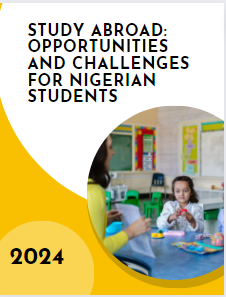
Study Abroad: Opportunities and Challenges for Nigerian Students
Overview Studying abroad piques the interest of Nigerian students. It opens the door to an endless number of opportunities by giving you the chance to learn about a variety of cultures, get an excellent education, and develop a global perspective. However, these opportunities come with a number of challenges that necessitate thoughtful preparation. The findings of this study will shed light on the numerous opportunities and challenges that Nigerian students considering academic travel abroad may face.
Opportunities for Nigerian students to go to college elsewhere
1. exemplary instruction When you study abroad, you typically have access to prestigious universities that are worldwide renowned for their exceptional academic programs. The prospect of receiving a top-notch education and being exposed to opportunities for cutting-edge research is irresistible to many Nigerian students.
2. Cultural exposure: Being completely immersed in a new culture presents a unique opportunity for personal growth. It broadens perspectives, encourages adaptability, and enhances cross-cultural communication skills, all of which are highly prized in today’s globally connected world.
3. Language proficiency: Living in a place where the dominant language is not the person’s mother tongue greatly enhances language immersion. This face-to-face encounter improves communication skills and accelerates language acquisition.
4. Networking and Connections: Studying abroad makes it easier to connect with people all over the world. Interacting with international teachers, students from other backgrounds, and cross-cultural events all help to build a valuable network of relationships that can be used in and out of the classroom.
5. Diverse Career Options: A wide range of skills are developed by students who are exposed to multiple educational systems. This adaptability develops into a useful quality that expands a person’s professional options and makes them more employable on a global labor market.
The obstacles Nigerian students face when considering international study
1. Limitations on the economy: Frequently, the financial obstacle is the most significant. When you study abroad, living expenses, lodging costs, and tuition can add up. Financial planning is essential for lowering these costs, despite the availability of scholarships and other forms of financial assistance.
2. Getting used to other cultures: Part of adjusting to a new culture is adjusting to new social norms, eating habits, and daily routines. This process of assimilating a new culture may lead to feelings of loneliness and longing for one’s home country.
3. Issues with Immigration and Visas: Navigating the bureaucratic procedures for obtaining a visa and adhering to immigration laws can be challenging and time-consuming; careful attention to detail is required.
4. Not being home: Being away from friends, family, and familiar surroundings can cause homesickness. Emotional damage may result from missing important family holidays and cultural events.
5. Education System Disparities: When adjusting to a new school system, teaching methods, and assessment formats, academic difficulties may initially arise. Understanding and accepting these differences is crucial to academic success.
Strategies for Overcoming Barriers to Study Abroad for Nigerian Students
1. Budgeting: With careful planning, part-time work options, and thorough research into potential scholarships, financial constraints can be reduced.
2. Cultural Adaptability: By actively participating in cultural orientation programs, interacting with international student communities, and seeking out opportunities for cultural immersion, one can facilitate the process of cultural adjustment.
3. Visa Application in Advance: Start the visa application process well in advance and ensure that all necessary paperwork is in order to avoid problems at the last minute.
4. Assistance with Mental Health: Utilizing the university’s mental health support services can help overcome emotional challenges and homesickness.
5. Creating a Positive Attitude: Embracing challenges as opportunities for personal growth and overcoming them with optimism can have a significant impact on the study abroad experience as a whole.
Leave a Reply